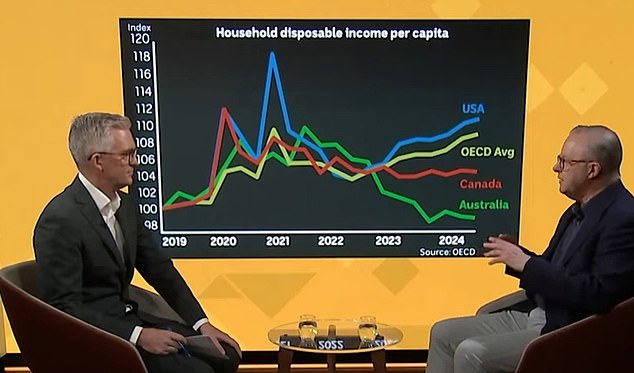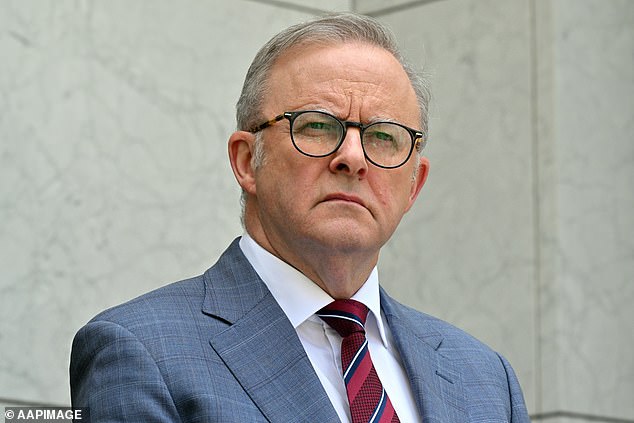Sydney student Freya Leach unleashes at Anthony Albanese’s government
A young conservative activist says Australians are ‘literally poorer’ under Anthony Albanese – highlighting alarming figures showing a dramatic drop in disposable income.
Freya Leach, 21, called Albanese the “worst prime minister of all time” in a video posted on social media.
‘A sincere question. When will people realize that this Labor government under Anthony Albanese is terrible? Guys, we are literally poorer. Inflation is rising, businesses are not investing and jobs are not being created,” Ms Leach said.
“If you don’t believe me, let me give you this one point. Australia has had the largest decline in real disposable income of any country in the developed world.
“Do you think this just happened out of the blue? You think we just fell out of a coconut tree and became poorer.’
Australian households have experienced an 8 per cent decline in inflation-adjusted, or after-tax, disposable income over the past two years, the OECD revealed.
Mr Albanese was confronted with the data on ABC’s Insiders program on Sunday.
Freya Leach, a 21-year-old conservative activist (pictured left) unleashed on Anthony Albanese in a video shared on social media

OECD data shows disposable income in Australia is plummeting
“Other countries, Canada, the OECD average, are doing better than Australia in terms of disposable income. Why is that?’ asked host David Speers.
Mr Albanese explained that the timing of the inflation wave is the main reason why Australians are worse off than people in other advanced economies.
‘Inflation abroad reached a higher and earlier peak than before [in Australia]. Interest rates were higher abroad, inflation was higher and it was earlier,” he explained.
“The impact because of where we are in the supply chain has happened later here and hence inflation, although we inherited it with a six in front of it when we came into office and is rising, now has a two in front of it and is falling.” , said Mr Albanese.
Inflation under Labor reached a 32-year high of 7.8 percent at the end of 2022, but has since moderated thanks to thirteen rate hikes.
Although interest rates are declining, they are still too high for the Reserve Bank to cut rates, which is another key factor in the ongoing cost of living crisis.
Ms Leach, the youth policy director at the Menzies Research Center think tank who led the University of Sydney Conservative Club, also argued that Australians were left worse off, not better, by Labor’s spending on social programs.
“This government has spent an extra $315 billion since the last election, fueling inflation,” Ms Leach said.
Her comments echo the Reserve Bank, which has suggested that spending by both state and federal governments has increased inflation as Australians miss out on interest rate cuts.
The futures market does not see the RBA cutting rates until May next year, even though borrowers in the US, UK, Canada, European Union and New Zealand have already received rate cuts this year.
Ms Leach also criticized Labor for reviving multi-employer bargaining, where wage increases in one workplace are replicated in others in the same sector.
That included workers being required to receive the same hourly wages as permanent employees under “same jobs, same pay” laws.
‘Their labor relations laws have made companies reluctant to hire people. It’s just that wages aren’t rising anyway, productivity has fallen, I could go on. This government is worthless,” she said.

Mr Albanese has cited the timing of inflationary pressures as the reason why Aussies are poorer than their counterparts around the world
Albanese used Parliament’s final week of the year to defend his government, arguing that Labor had inherited “a number of challenges” after winning the 2022 election.
While Labor has run two budget surpluses, the Treasury predicts a $28.3 billion deficit by 2024-2025 as a fall in iron ore prices hurts public sector companies’ tax revenues.
Australian productivity growth is still very weak and Australia has been in per capita recession since early 2023, due to record immigration levels.
But unemployment is still low at 4.1 percent and wages rose by 3.5 percent annually in September.
Adjusted for inflation, real wages will rise by only 0.7 percent.
While headline inflation is at a three-year low of 2.8 percent, this is the result of one-time $300 electricity rebates and temporarily cheaper gasoline.
Underlying inflation, excluding volatile items, is higher at 3.5 percent and above the Reserve Bank’s target of 2 to 3 percent.
Inflation in the services sector is even higher at 4.6 percent, proving that the cost of living crisis is far from over.
Ms Leach ran unsuccessfully last year as a Liberal candidate for the Greens electorate in Sydney’s inner west, Balmain.
